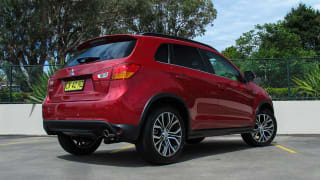
Mitsubishi ASX LS 2WD petrol 2017 review
Tim Robson road tests and reviews the 2017 Mitsubishi ASX LS 2WD petrol with specs, fuel consumption and verdict.
Browse over 9,000 car reviews
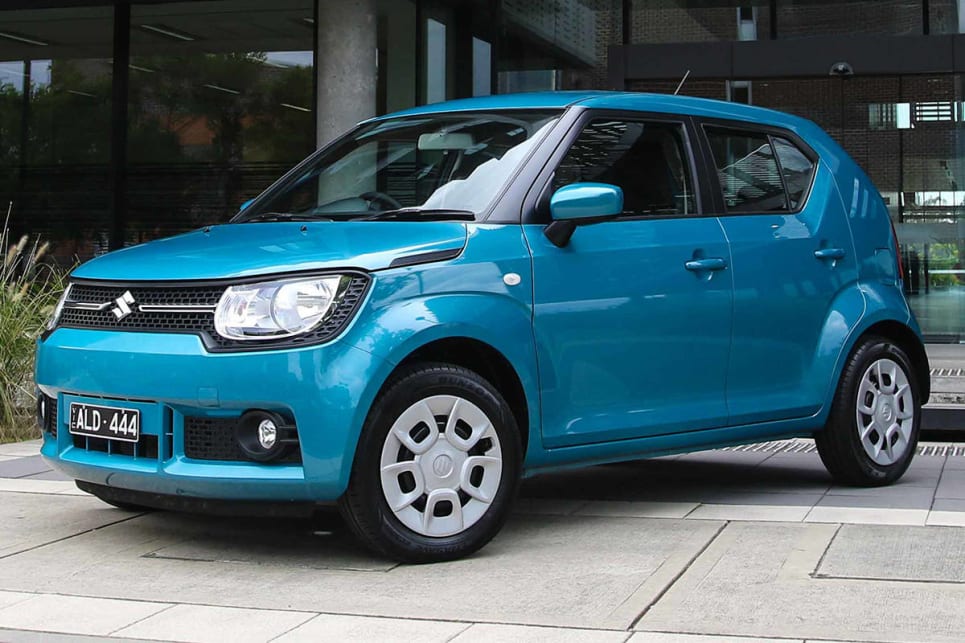
Sometimes it's not enough to offer a car that is cheap; it needs to have a hook, too. While unusual looks are one way to stand out, the line between 'quirky' and 'sales flop' is a fine one; just look at the Toyota Rukus.
The reborn Suzuki Ignis – it was first sold here in the early part of the century - seems to have nailed both traits, though, offering up a cheap price point and friendly, engaging looks that aren't polarising.
What is it about this deceptively simple little car that makes people stop in their tracks?
| Suzuki Ignis 2017: GL | |
|---|---|
| Safety rating | |
| Engine Type | 1.2L |
| Fuel Type | Premium Unleaded Petrol |
| Fuel Efficiency | 4.9L/100km |
| Seating | 5 seats |
| Price from | $10,560 |
Suzuki is in the midst of a product resurgence, but it's hard to pin that on design. The reborn Baleno hatch, for example, is definitely an odd little fish, while the redone Vitara and Grand Vitara are straight down-the-line SUV clones.
The Ignis, though, is unlike any of them. Marketed as a small SUV against the likes of the Mazda CX-3 and Toyota's new C-HR, it's smaller than both at just 3700mm in length – and it looks it, too.
Bluff surfaces and straight lines dominate the looks, while a grille treatment like few others on the road dominates its nose. Don't like the grille colour? Option your own from three different choices.
Exaggerated wheel arches, non-existent front and rear overhangs and high body sides complete the mini off-roader vibe.
Overall, it works well, and it's certainly something you don't see every day.
Inside, Suzuki's design team has cleverly hidden its price point-driven plastic surface content with clever design and used of colours. The white plastic door cards and dash strip won't stay clean for long in dustier environments, but it's a clever device to break up up swathes of dimpled plastic.
Suzuki has also brought the outside in, adding body-coloured pieces to the centre console, door handles and air conditioning vents. You can even option your own colour palette, which can be easily fitted at a dealer (rather than at the factory).
A simple dash treatment is dominated by a tablet-like touchscreen, while the instrument binnacle and manual air con controls are stripped back as well.
Overall, it works well, and it's certainly something you don't see every day.

While its external dimensions are relatively small for the category, the Ignis really opens up on the inside. There is plenty of room for four people aboard thanks to clever packaging and a high roofline, while a fifth passenger can be crammed into the middle of the second row.
The GL loses the clever sliding rear seats of the GLX, but gains that extra passenger point. Seat comfort is good, and rear head, toe and knee room is impressive for such a small car.
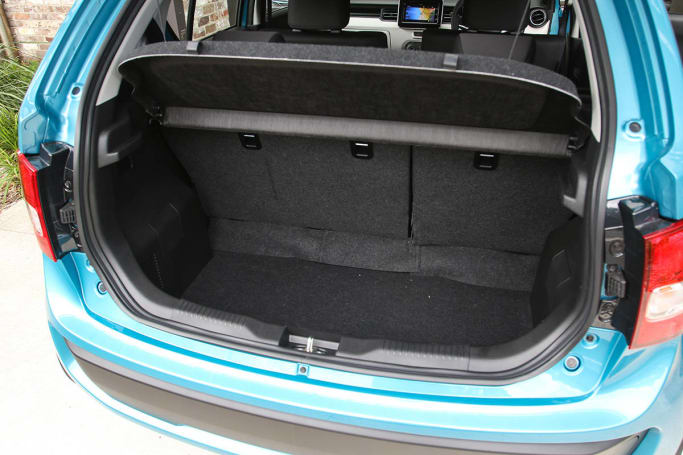
The rears tumble down, although they do leave a large lump in the cargo area. There is 271 litres of luggage space behind the seats (just seven more than the GLX), or 1101 litres maximum (three less than the GLX) with everything folded as flat as possible.
Because there's no centre console bin for the front, there are no vents for the rear, nor are there USB chargers. There are a pair of ISOFIX baby seat mounts, though, and a single USB port up front.
While the front seats are softly cushioned, they're still comfortable on even longish journeys. One small downside is that the steering wheel is only adjustable for height, and not for reach.
The Ignis's instrumentation is simple, super clear and easy to read. Users aren't confronted by a mass of dials and switches; instead, a simple touchscreen controls most of the functions of the car and a clear dash readout tells you the rest. It does miss out on a digital speedo, though.
There are two cup holders side by side in front of the gear shifter, along with a sizeable mobile phone pocket beneath the air con controls.
There's also a shallow pocket underneath the manual handbrake, but because there's no centre console bin, a third cup holder lives between the two front seats for the back seat occupants.
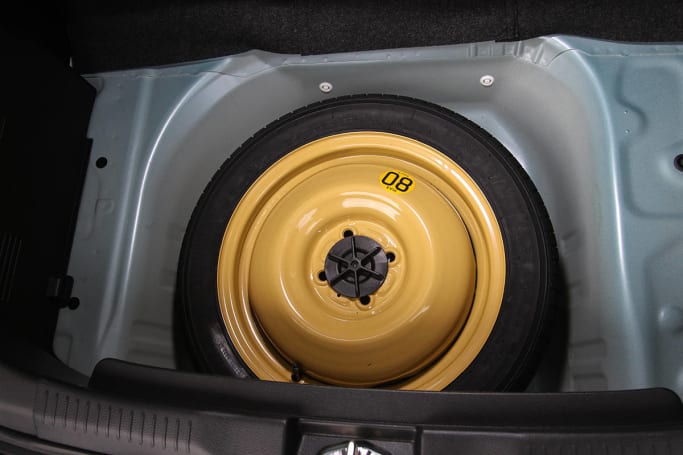
Both front and back seaters get a bottle holder each in the door cavity.
It's worth mentioning its generous ground clearance – it sits 180mm above the ground – wide door apertures and minimal overhangs front and rear, too; it's easy to hop in and out of and an absolute doddle to park. Suzuki has also added a space saver spare under the boot floor.
All Ignises – Ignii? - use the same 66kW 1.4-litre four MultiJet engine, and all are front-wheel drive to boot. The base model Ignis starts at $16,990 before on road costs for a white, manual gearbox-equipped version, while adding a continuously variable transmission (CVT) (as tested) tacks $1000 on to the price.
While the bold colour palette of the Ignis is one of its strong points, the price also goes up accordingly. Metallic colours like orange, blue and red are $500 extra, while adding a black roof will set you back an additional $500.
The internal colour pieces, too, will set you back $630 if you want to mix things up.
The Ignis GL differs from its $19,990 GLX stablemate in some areas – and there are a couple of changes that have taken the Ignis's practicality back a step too far.
The 16-valve naturally aspirated unit uses dual injectors on each piston with a higher compression ratio to provide zingy, rev-happy performance.
The GL's seat set is different, with a traditional 60/40 split fold rear seat replacing the clever sliding rear seats of the GLX, while the front seats lose their adjustable height function. The rear seat layout is a fair change, but the seat height function is a disappointing omission.
The brilliant multimedia touchscreen unit remains intact, offering a rear view camera, sat nav, Bluetooth phone connectivity and streaming in a modern, easy to use form.
It does, however, lose even the minimal forms of automation that feature in the GLX. I haven't driven a car in years that won't turn off its own headlights – even manually operated ones - when the ignition is switched off, and that strikes me as silly.
The simpler, analogue air conditioning system is a more logical cost saver over the digital version in the GLX.
Smaller diameter 15-inch steel rims and hubcaps replace 16-inch alloys on the GL, as well as halogen headlights over LED items.
Looking just at the numbers, the Ignis appears somewhat uninspiring, with a naturally aspirated 1.2 litre four-cylinder engine making a mere 66kW at a high 6000rpm and 120Nm of torque at 4400rpm, matched to a six-speed manual or a CVT driving the front wheels. We tested the GL with a CVT, but we're keen to try the manual, too.
Don't let the specs fool you. Suzuki has always known how to build good small-capacity engines, and the 16-valve naturally aspirated unit uses dual injectors on each piston with a higher compression ratio to provide zingy, rev-happy performance.
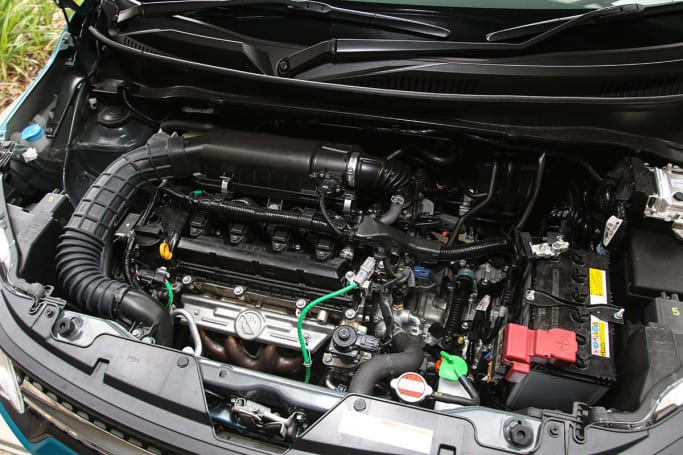
It gets a bit noisy at the top end of the rev range – as much a symptom of the way the CVT works as anything – but it's economical and amusing at the same time. Combine it with the ridiculously low 865kg kerb weight (a FWD CX-3 weighs 1275kg by way of comparison), and it's more than good enough for urban work.
The CVT offers a 'low range' option, which seems to do little other than rev the engine to no great affect, as well as a 'sport' button that again just lets the engine rev higher. A CVT is essentially a single speed gearbox, so the window dressing tricks aren't of much use in the real world.
Against a claimed average of 4.9 litres per 100km, we recorded a dash indicated figure of 5.4L/100km.
We used 18 litres of fuel (from a 32 litre tank) to travel 320km, which indicates a real-world figure closer to 5.6 L/100km.
Thanks to its lack of mass – it weighs just 865kg at the kerb, and the manual is 45kg lighter again - the Ignis is a surprisingly fun little car to drive.
It's lively and easy to handle, it steers perfectly adequately and turns and stops with confidence. The whine and the flare of the CVT are more prominent when you start to drive the car, as well as an odd notchy feeling when it's cold, but it becomes less intrusive the more you drive it.
The ride in particular is a real standout. Most small cars have a brittle, sharp edged ride as a result of essentially smaller suspension packaging; there's just not enough travel to give the car any sort of comfortable ride.
Suzuki engineers have managed to give this little jigger a large car ride and feel, by compromising the basic set up for an unladen state. If, for example, you load the car right up with two people and a lot of gear, that comfortable ride will soon disappear into sharp edged oblivion.
For a small car that weighs this little, though, its ability to filter out noise is excellent.
With just one or two people aboard on a normal suburban road, though, the Suzuki rides like a car twice its size. The higher profile 15-inch tyres also iron out the ride a little bit better than the 16s on the GLX, but the smaller tyres don't feel as nice or work as well as the larger items.
It's not perfect; the steering has a lack of what's called self-centering, which basically means it doesn't want to track in a straight line if you're resting a hand even lightly on one side of the wheel.
There's also some wind rustling around the A pillars and the windscreen at freeway speeds, but again this disappears around town.
There's a bit of tyre roar on rougher tarmac but it all but disappears again when the going smooths out. For a small car that weighs this little, though, its ability to filter out noise is excellent.
Basic Warranty
3 years / 100,000 km warranty
ANCAP Safety Rating

The Ignis hasn't yet been rated by ANCAP, but it only scored three out of five stars in Euro NCAP testing, thanks to a lack of standard driver aids like AEB and lane departure warning.
No driver aids are offered on Australian-spec cars, either, even though there is an optional safety pack available in overseas markets.
Standard safety gear includes six airbags - including curtain bags and thorax bags for front row occupants - EBD, ABS and hill-hold assist.
Suzuki offers a standard three-year, 100,000km warranty for the Ignis, which trails offers from rivals like Kia of up to seven years and unlimited kilometres.
Servicing is recommended at 10,000km or six-month intervals, which is again shorter than intervals suggested by competitors like Mazda and Toyota. A five-year capped price service program costs $2207 in total.
The reborn Suzuki Ignis looks to be winning the battle of the heart with new car buyers, and if you're careful with how you buy it, it represents good value, too. Resisting the urge to add colourful trim bits, for example, will save loads (though where's the fun in that?).
Its short servicing intervals and a lack of driver safety aids play against it for pragmatists, however.
On balance, the Ignis is a car that makes you – and others – smile, and it's a comfortable, affordable and practical city machine that's easy on the juice. If you're looking to stray from the norm, the Ignis is worth a look.
| Vehicle | Specs | Price* | |
|---|---|---|---|
| GL | 1.2L, PULP, 5 SP MAN | $9,900 – 13,530 | 2017 Suzuki Ignis 2017 GL Pricing and Specs |
| GLX | 1.2L, PULP, CVT AUTO | $12,100 – 16,060 | 2017 Suzuki Ignis 2017 GLX Pricing and Specs |
| GL (qld) | 1.2L, PULP, 5 SP MAN | $7,370 – 10,340 | 2017 Suzuki Ignis 2017 GL (qld) Pricing and Specs |
| GLX (qld) | 1.2L, PULP, CVT AUTO | $12,100 – 16,060 | 2017 Suzuki Ignis 2017 GLX (qld) Pricing and Specs |
| Design | 8 |
|---|---|
| Practicality | 7 |
| Price and features | 7 |
| Under the bonnet | 7 |
| Efficiency | 7 |
| Driving | 8 |
| Safety | 6 |
| Ownership | 6 |
$8,800
Lowest price, based on 23 car listings in the last 6 months